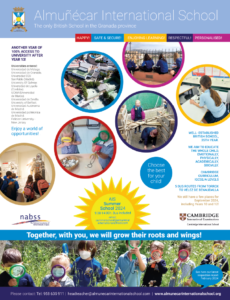
Our school accepts children from Nursery (Early Years) to Sixth Form, so the little ones can start from 3 years of age.
Classes start at 9:50 a.m. and end at 5:00 p.m. Each one takes the school bus at the appropriate time according to each route
It depends which year group you would like to access. In the initial interview with the Head teacher, she will inform you of the requirements regarding the level of English depending on the year group.
Currently 250 students are enrolled and the maximum we have per class is around 15-22 students. There is only one class per year, although we sometimes divide them into two groups to make learning easier.
Our sixth students obtain the British qualification, although the Spanish one is also validated, so our students obtain both Spanish and British qualifications.
The British degree is recognized worldwide, so our students get access to any European or American university
AIS students start learning through new technologies at the young age of 5,
in Year 1 , where they start with coding and computing.
The school has Chromebooks and digital whiteboards and it is recommended that parents from Year 5 students onwards buy their own Chromebook, although the school does have Chromebooks and digital whiteboards for computing and coding classes.
The school has 5 routes. Click the link to see the routes and schedules. The school also has an app so you can follow your child’s route at any time.
Currently the school offers sports clubs several days a week and a drama club on Fridays for certain ages. For more information please contact the school.
Our SENCO offier works with all students.
The main difference between our school, which is British, and a bilingual school, is that in the bilingual school, some subjects are taught in English, but in general, the Spanish curriculum and methodology are followed in Spanish.
However, our school follows the British curriculum in all areas except Spanish Language and Culture (Sociales). Thus, this implies a deep immersion of the students in the British system, since both the methodology and the language used in the classes are English.
It depends on each class and year. The school average currently is approximately 60% Spanish, 20% British and the rest are other nationalities.
The tuition is paid each year to reserve a school place. The fees cover schooling, transportation, food and most of the educational resources such as notebooks, books, computer platforms, materials, and resources for laboratory experiments.
Students learn a second language from Year 6, which is the last year of primary school, and have one semester in French and one in German so that in Year 7 they can choose which one they want to study. This way, the children have sufficiently consolidated their mother tongue and their first language (English) and feel comfortable receiving a different one without interfering with learning English.
Yes, our school has its own kitchen. This means that a cook and his team, prepare and revise the menu every day in the school kitchen, so that what our students eat is always fresh and freshly cooked products. The school’s menus are reviewed by a specialized nutritionist.
Yes. At AIS we adapt to the needs of our students, and in matters of nutrition as well. Whether it is allergies or intolerances, or other ethical-religious issues, by informing the Center the menu will be adapted to the students who require it. If it is allergies or intolerances it is necessary to provide a medical report about it.
It is mandatory for all our students to eat at school.
Our students can access any university in the world, both Spanish universities and the rest of the EU, as well as British and even American ones. Both private and public.
All our secondary school teachers, and in particular the sixth form tutor and team, help students choose the career they want to do, making several trips to exhibitions about universities as well as organizing various “career talks” (informative talks by professionals) to help everyone students to choose what they like best and what best suits them.
Most of our students choose British, Irish and Spanish Universities.
